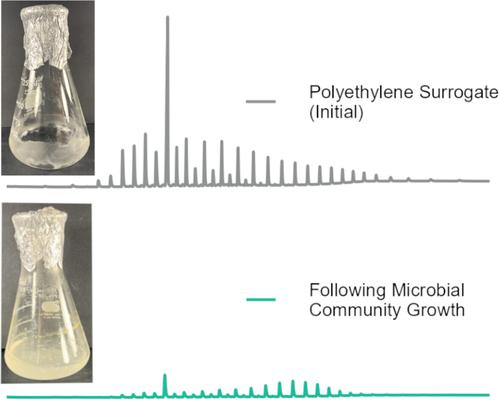当前位置:
X-MOL 学术
›
Environ. Microbiol.
›
论文详情
Our official English website, www.x-mol.net, welcomes your
feedback! (Note: you will need to create a separate account there.)
A polyethylene surrogate for microbial community enrichment and characterization
Environmental Microbiology ( IF 4.3 ) Pub Date : 2024-06-06 , DOI: 10.1111/1462-2920.16658 Bilge Bahar Camur 1 , Natalia Calixto Mancipe 1 , Brett M. Barney 1, 2
Environmental Microbiology ( IF 4.3 ) Pub Date : 2024-06-06 , DOI: 10.1111/1462-2920.16658 Bilge Bahar Camur 1 , Natalia Calixto Mancipe 1 , Brett M. Barney 1, 2
Affiliation

|
Plastic pollution is a vast and increasing problem that has permeated the environment, affecting all aspects of the global food web. Plastics and microplastics have spread to soil, water bodies, and even the atmosphere due to decades of use in a wide range of applications. Plastics include a variety of materials with different properties and chemical characteristics, with polyethylene being a dominant fraction. Polyethylene is also an extremely persistent compound with slow rates of photodegradation or biodegradation. In this study, we developed a method to isolate communities of microbes capable of biodegrading a polyethylene surrogate. This method allows us to study potential polyethylene degradation over much shorter time periods. Using this method, we enriched several communities of microbes that can degrade the polyethylene surrogate within weeks. We also identified specific bacterial strains with a higher propensity to degrade compounds similar to polyethylene. We provide a description of the method, the variability and efficacy of four different communities, and key strains from these communities. This method should serve as a straightforward and adaptable tool for studying polyethylene biodegradation.
中文翻译:

用于微生物群落富集和表征的聚乙烯替代品
塑料污染是一个巨大且日益严重的问题,已经渗透到环境中,影响着全球食物网的各个方面。由于几十年来的广泛应用,塑料和微塑料已经扩散到土壤、水体甚至大气中。塑料包括具有不同特性和化学特性的各种材料,其中聚乙烯是主要部分。聚乙烯也是一种极其持久的化合物,光降解或生物降解速度较慢。在这项研究中,我们开发了一种方法来分离能够生物降解聚乙烯替代品的微生物群落。这种方法使我们能够研究在更短的时间内潜在的聚乙烯降解。使用这种方法,我们富集了几个可以在几周内降解聚乙烯替代品的微生物群落。我们还确定了具有更高的降解类似于聚乙烯的化合物的倾向的特定细菌菌株。我们提供了该方法的描述、四个不同群落的变异性和功效以及这些群落的关键菌株。该方法应作为研究聚乙烯生物降解的简单且适应性强的工具。
更新日期:2024-06-07
中文翻译:

用于微生物群落富集和表征的聚乙烯替代品
塑料污染是一个巨大且日益严重的问题,已经渗透到环境中,影响着全球食物网的各个方面。由于几十年来的广泛应用,塑料和微塑料已经扩散到土壤、水体甚至大气中。塑料包括具有不同特性和化学特性的各种材料,其中聚乙烯是主要部分。聚乙烯也是一种极其持久的化合物,光降解或生物降解速度较慢。在这项研究中,我们开发了一种方法来分离能够生物降解聚乙烯替代品的微生物群落。这种方法使我们能够研究在更短的时间内潜在的聚乙烯降解。使用这种方法,我们富集了几个可以在几周内降解聚乙烯替代品的微生物群落。我们还确定了具有更高的降解类似于聚乙烯的化合物的倾向的特定细菌菌株。我们提供了该方法的描述、四个不同群落的变异性和功效以及这些群落的关键菌株。该方法应作为研究聚乙烯生物降解的简单且适应性强的工具。































 京公网安备 11010802027423号
京公网安备 11010802027423号